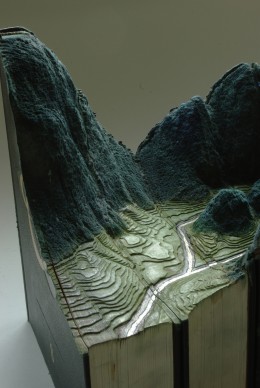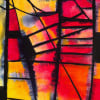Is our culture the product of thousands of years of accumulation or erosion?
Is our culture the product of thousands of years of accumulation or erosion?
I have recently published a hub that compiles the thoughts-in-the-form-of-art of Artist Guy Laramee regarding the erosion of culture. He carves out his ideas in to unused encyclopedias to create stunning landscapes. What do you think? Are we really losing large chunks of our culture as we continue to become more advanced?
Both. We loose large chunks of our culture as we gain whole new chunks. "The only thing constant is change" -François de la Rochefoucauld.
I see the erosion, but also think there is an alternate message. By the way, some of these books are not encyclopedias (some are his own works).
He says: "Mountains of disused knowledge return to what they really are: mountains. They erode a bit more and they become hills. Then they flatten and become fields where apparently nothing is happening...Fogs and clouds erase everything we know, everything we think we are."
In the final photo of your hub, the book seems to be acting much like a volcano, producing more content that replaces the old. That's what I think his final message is. We carve-out and perfect the old to make room for the new.
Like evolution, it's about progressing and becoming better; carving out what is unnecessary. I think society needs this to function and evolve and for those that have nostalgia for the old methods are allowed to practice them (like my passion for vinyl records).In Hindu scripture (which I'm very interested in), it says that people millions of years ago used to be highly in-tune with nature and the cosmos, and lived for thousands if not millions of years in a state of equilibrium and meditation with the divine. It also says that as time goes on, the only people left are those that just aren't "getting it," thus we are now in the Age of Kali, or "the Age of Quarrel." There's supposed to be one more Golden Age within the KaliYuga, and that is very soon. There will be a renewal of awareness and connectedness with higher thought processes.
- Old Empresarioposted 12 years ago
0
I agree. High art is in decline, while low-brow entertainment flourishes. Commercial technology is on on the rise; while education, understanding, and reason are not. Religion and fear increase; while compassion and rule of law are waning.
Well to be honest I love change, if things didn't change over time we would all experience a sort of endless looping event. That would get boring really quick, and there would be a great deal of more chaos involved with people & things bumping or colliding into one another or should I say resulting in conflicts of this over looping process. Change is in place and is a universal which has been rendered by our higher powers, on down to us all, & so we can view such a process and work with what we have to make eventual needed changes and or adjustments.
Not every change is for the good, or the greater good of us all & so I can see why he tended to steer towards the erosion of culture idea, as if ones culture most be keep and maintained. I think that culture is what we make of our outward reality, and is pretty much a self projection of what we interpret our world to be, as a form of self expression. So as time progresses & moves on, change also will follow and regardless of the level of resistance to it all. Actually the more resistant one is to change, the greater potential that will build up for it to actually occur. Just look at the universe as a whole.
Also you cannot stop the flow and direction of a Tsunami, a Wave, a Typhoon, a Cyclone, a Hurricane, a Tornado, a Supernova, a Black Hole, and the likes, and all these are naturally occurring and bring fourth rise to inevitable change or eventual erosion. These all have a long lasting effect on us all, and definitely can end one form of existence, to only make room for yet another, which our creator promises to continue such a universal activity if not any at all.I read your hub and voted it up
 I think Guy Laramee's work is absolutely fascinating. I think our culture is a product of both accumulation and erosion over thousands of years.
I think Guy Laramee's work is absolutely fascinating. I think our culture is a product of both accumulation and erosion over thousands of years.Yes, we are a product of our culture and erosion has occurred many times in past civilizations. Just to look at ancient Rome and the Greeks, as well as the Mayans and ask the question...where did they all disappear to, or did they just spread apart into many other cultures and start all over again?
Culture is generated by ups and downs in society and natural disasters and wars, both have a lasting effect on all cultures. Many products of culture are strongly influenced by past ones in civilizations, some more recent , than others, yet there is a beauty in each and this is what is recorded in our art work. It is a good thing in that we preserve all beautiful objects of art, no matter the age or influences there may be. As a difference in our representation of culture, just compare Andrew Wyeth paintings to Andy Warhol, Lautrec to Remington, or even Renoir. Leonardo da Vinci sculpture to Rodin.I like to visualize the human nature as a water-filled keg, you can't push something in without pushing some water out. Sometimes you are losing precious water to make room for a dirty stone, other times you are adding honey.
Jewish, Christian and Islamic scripture indicates that the old man was a giant creature that carved its houses in the sides of mountains. Now that could seem crazy but if you visit the shrines of the Jew prophets in the North and Bekaa areas in Lebanon i'm sure you can believe this. Does that mean we too are 'eroding'?
Related Discussions
- 7
How to sort through years of accumulation when moving for the first time in 30 y
by KRC 12 years ago
How to sort through years of accumulation when moving for the first time in 30 years?After you've been settled for a number of years you tend to accumulation a lot of junk. It can be an emotional and daunting task. How do you begin to sort through it and decide what to keep and...
- 5
You Know What is Term Life Insurance?
by income-protection 12 years ago
You Know What is Term Life Insurance?
- 87
It is time to talk about climate again - while we still can.
by Scott Belford 5 months ago
I hope all those climate deniers out there are eating crow and feeling bad for helping to get things this bad so...
- 106
Fellow tattooed friends: Do your tattoo's itch or become raised at times?
by stylezink 5 years ago
Fellow tattooed friends: Do your tattoo's itch or become raised at times? I'm talking to those that have had a tattoo for years, not fresh ink. All of my tattoo's itch or become raised, mainly the outlines, I was wondering if anyone has the same issue. Everything I read online is referencing the...
- 8
Is Imagination better than knowledge?
by Junaid Ghani Durrani 9 years ago
Is Imagination better than knowledge?Einstein said,"Imagination is more important than knowledge." I am asking, which is better among both. Imagination is the powerful tool we have in life, but there is knowledge too, when we want to select in between, what is the more better option for...
- 7
Is there a book out there greater than the Holy Book?
by Annie 13 years ago
Is there a book out there greater than the Holy Book?Throughout history, many books have been written, but is there a book greater than the Bible,















